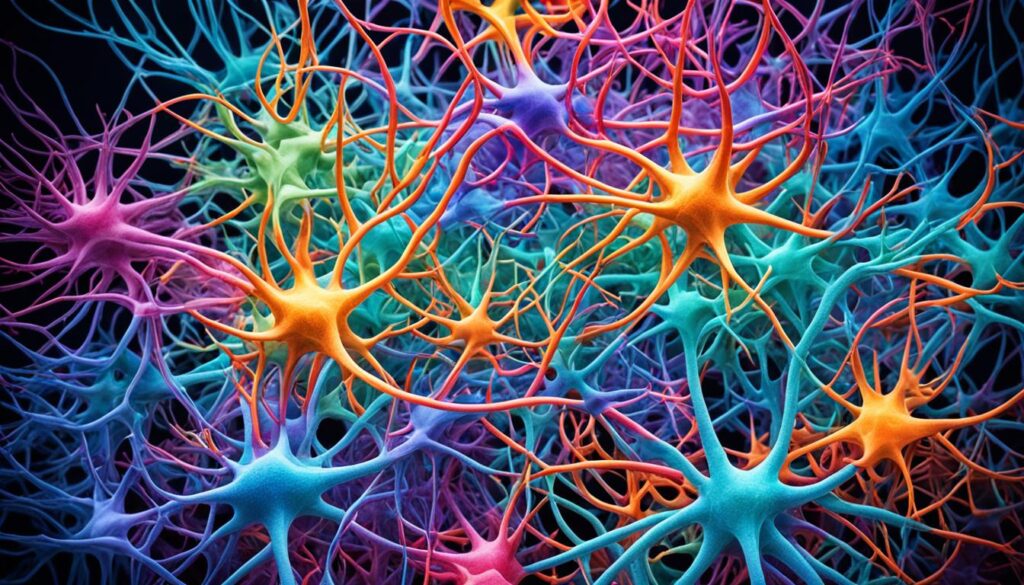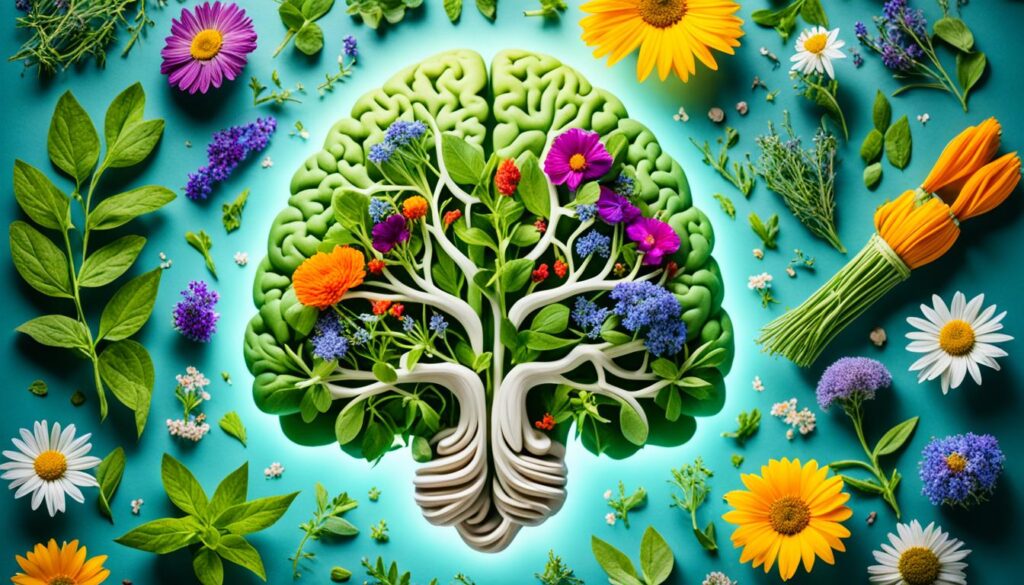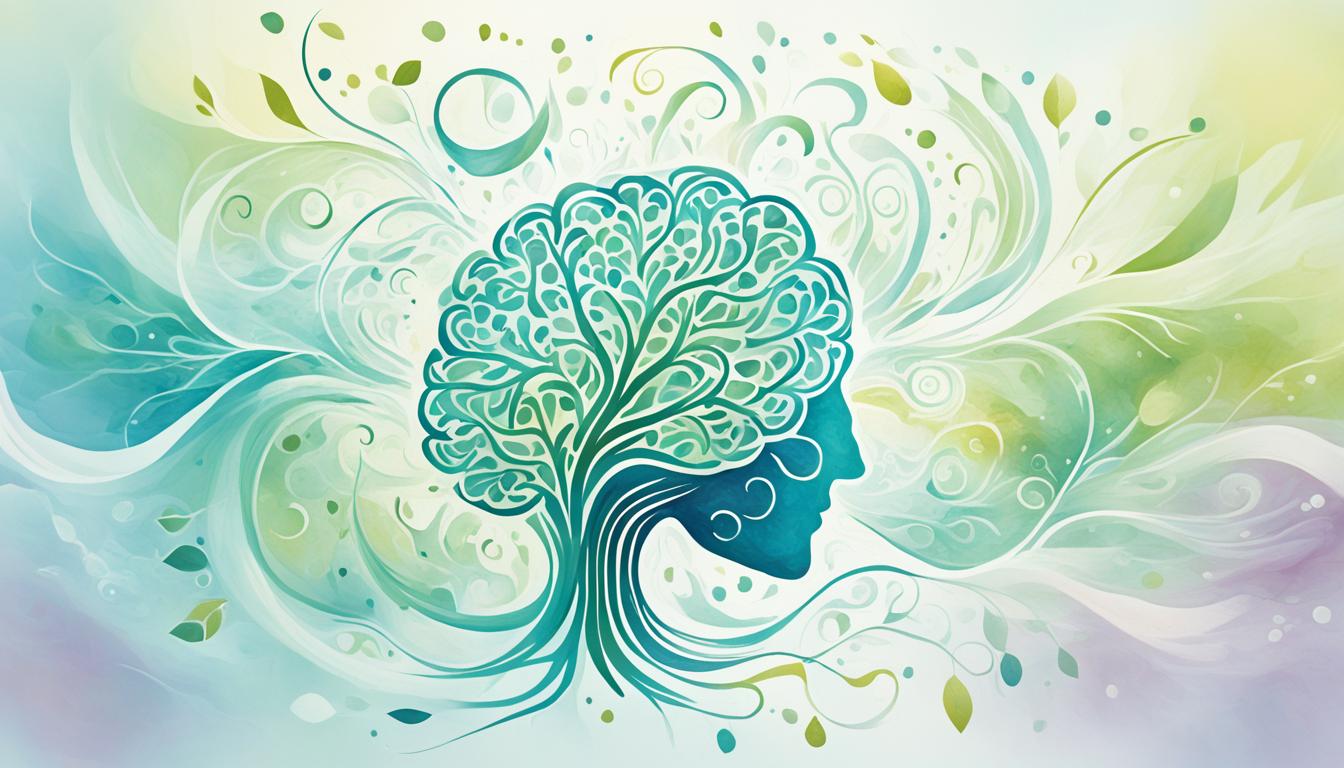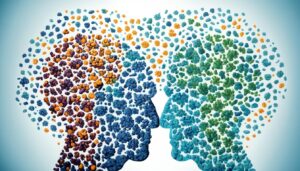Antidepressants can be a helpful tool in managing depression and improving overall mental health. However, many individuals are unaware of the potential effects these medications can have on the brain. When coming off antidepressants, it is crucial to prioritize brain healing and recovery to restore cognitive function and promote overall well-being.
Recovering brain function after antidepressants requires a holistic approach that combines various strategies to support neuroplasticity and overall brain health. This guide will provide you with valuable insights and practical techniques to help you heal your brain and optimize your post-antidepressant journey. Let’s deep dive into how to heal your brain after antidepressants.
Key Takeaways:
- Antidepressants can affect the brain and its cognitive function.
- Brain healing after antidepressant use is essential for recovery.
- Signs of brain healing include improved mood and cognitive function.
- Natural remedies, healthy lifestyle choices, and professional support can aid in brain healing.
- Self-care practices are crucial for overall brain health and recovery.
Understanding the Impact of Antidepressants on the Brain
Antidepressants play a crucial role in the treatment of depression and other mental health conditions. However, it’s essential to understand how these medications impact the brain to fully grasp their effects and potential long-term consequences.
The Role of Neurotransmitters in Depression and Antidepressant Therapy
Depression is often linked to an imbalance of neurotransmitters, chemical messengers that communicate signals between brain cells. Antidepressants work by increasing the availability of certain neurotransmitters such as serotonin, norepinephrine, and dopamine. By doing so, these medications help regulate mood and alleviate symptoms of depression.
Neuroplasticity and Antidepressant Use: What Happens to the Brain?
One fascinating aspect of the brain is its ability to change and adapt, known as neuroplasticity. Antidepressants can influence neuroplasticity by promoting the growth of new nerve cells (neurogenesis) and strengthening the connections between existing ones. These changes can contribute to improved mood and overall brain function.
Long-Term Effects of SSRIs on Brain Structure and Function
Selective serotonin reuptake inhibitors (SSRIs), a commonly prescribed class of antidepressants, have been extensively studied for their long-term effects on the brain. Research suggests that prolonged SSRI use may lead to structural alterations in certain brain regions and affect neural circuits involved in emotion regulation. It’s important to note that the clinical significance of these changes is still being investigated.
Understanding the impact of antidepressants on the brain is crucial for informed decision-making and optimizing treatment outcomes. The next section will delve into the signs that indicate your brain is healing after coming off antidepressants.
Signs Your Brain Is Healing Post-Antidepressants
After coming off antidepressants, it’s natural to wonder if your brain is healing and returning to its normal state. Recognizing the signs of brain healing can provide reassurance and encouragement on your journey to recovery.
Recognizing Improvements in Mood and Cognitive Function
One of the most notable signs of brain healing after antidepressant use is an improvement in mood. You may start to notice a lift in your overall feelings of happiness and well-being. The cloud of sadness and despair that often accompanies depression may gradually dissipate, allowing for a brighter outlook on life.
“I’ve noticed that my mood has become more stable and positive since I stopped taking antidepressants. I feel like I’m able to experience joy and happiness again, which is such a relief.” – Amy, 34
In addition to improvements in mood, you may also experience a recovery of cognitive function. This can manifest as increased clarity of thought, improved concentration, and enhanced memory. Once challenging tasks may become easier, allowing you to engage more fully in daily activities.
“I used to struggle with brain fog and forgetfulness while I was on antidepressants. But now, my cognitive function has improved, and I feel like I can think more clearly and focus better.” – Daniel, 42
Changes in Sleep Patterns and Energy Levels as Recovery Progresses
Another sign that your brain is healing after coming off antidepressants is changes in sleep patterns. Antidepressants can sometimes disrupt sleep, causing insomnia or excessive sleepiness. As your brain recovers, you may notice a return to more regular sleep patterns, with better quality sleep and an improved ability to fall asleep and stay asleep.
Alongside changes in sleep patterns, you may also experience shifts in energy levels. Antidepressants can sometimes cause fatigue or a lack of motivation. As your brain heals, you may find that your energy levels increase, allowing you to engage in activities with more enthusiasm and vigour.
It’s important to remember that brain healing is a gradual process, and the timeline for recovery can vary from person to person. Be patient with yourself and celebrate even small improvements along the way.

How to Heal Your Brain After Antidepressants
After coming off antidepressants, it is important to prioritize the healing of your brain. Promoting brain health and allowing for the recovery of cognitive function are crucial during this process. To aid in your brain’s healing, here are some practical strategies and techniques that you can implement:
- Engage in regular physical activity: Exercise is beneficial for brain health and can stimulate the production of neurotrophic factors that promote neural growth and recovery.
- Participate in mental stimulation activities: Keep your brain active by challenging yourself with puzzles, reading, learning new skills, or engaging in creative hobbies. This can help improve cognitive function and facilitate brain healing.
- Practice self-care: Taking care of your overall well-being is essential for brain recovery. Prioritize activities such as getting enough sleep, eating a balanced diet, managing stress, and engaging in relaxation techniques such as meditation or deep breathing exercises.
- Stay socially connected: Maintain and cultivate positive social relationships. Engaging in social activities and having a support network can contribute to mental well-being and aid in the healing process.
- Consider cognitive-behavioral therapy (CBT): Therapy can provide valuable tools and support for addressing any lingering psychological concerns and facilitating emotional healing.
- Explore holistic approaches: Some individuals find benefit from holistic practices such as acupuncture, massage therapy, or herbal supplements. Consult with a healthcare professional before incorporating these practices.
Remember, brain healing is a gradual process, and each person’s journey is unique. Be patient with yourself, and give your brain the time and care it needs to recover.
By implementing these strategies and techniques, you can actively support your brain’s healing after coming off antidepressants. Take the necessary steps to promote brain health and seek professional guidance if needed. Your brain has remarkable resilience, and with time and care, it can recover and regain its optimal functionality.

Natural Remedies and Techniques for Brain Recovery
When it comes to healing the brain after stopping antidepressants, many natural remedies and techniques can support the recovery process. By leveraging holistic approaches, incorporating neuroplasticity and mindfulness practices, and adopting a diet supplemented with brain-supporting nutrients, you can promote brain healing and restore optimal cognitive function.
Leveraging Holistic Approaches for Brain Healing
Holistic approaches focus on treating the whole person—mind, body, and spirit. These practices aim to restore balance and promote overall well-being. Acupuncture, for example, can help stimulate energy flow and enhance brain function. Meditation and mindfulness exercises, such as deep breathing and visualization, can calm the mind and reduce stress, supporting the healing process. Incorporating these holistic methods into your daily routine can significantly contribute to brain recovery.
Neuroplasticity and Mindfulness: Strengthening Your Mental Health
Neuroplasticity refers to the brain’s ability to change and adapt. By engaging in activities that stimulate neuroplasticity, such as learning new skills or engaging in creative pursuits, you can enhance brain function and promote recovery. Mindfulness practices, such as meditation and yoga, can also strengthen mental health by increasing self-awareness and reducing anxiety and depression. By integrating neuroplasticity and mindfulness into your lifestyle, you can create a positive environment for brain healing.
Diet and Supplements That Support Brain Function Restoration
The food you eat plays a crucial role in brain health and recovery. Consuming a balanced diet rich in nutrients can provide the building blocks necessary for optimal brain function. Incorporate foods such as berries, leafy greens, and nuts, which are high in omega-3 fatty acids, antioxidants, and other essential nutrients. Additionally, certain supplements, such as omega-3 Walnuts, vitamin B complex, and magnesium, can support brain function restoration. Always consult with a healthcare professional before starting any supplements to ensure their suitability for your specific needs.

Coping Strategies and Lifestyle Adaptations During Withdrawal
During the withdrawal process from antidepressants, it is important to implement coping strategies and lifestyle adaptations to support brain healing and overall well-being. These strategies can help manage the challenges that may arise during this transitional period and promote a smoother recovery.
Physical Activity: A Keystone of Brain Health and BDNF Production
Engaging in regular physical activity not only has numerous benefits for your overall health but also plays a crucial role in promoting brain health and the production of brain-derived neurotrophic factor (BDNF), a protein essential for brain healing. Incorporating exercise into your routine can help alleviate withdrawal symptoms, boost mood, and enhance cognitive function.
Whether it’s going for a walk, practicing yoga, or participating in a sport you enjoy, finding activities that you find enjoyable and sustainable is key. Aim for at least 30 minutes of moderate-intensity exercise most days of the week, but listen to your body and adjust accordingly.
Creating and sticking to healthy routines can provide structure and stability during the withdrawal process. Designate specific times for activities such as sleep, meals, exercise, and self-care. By establishing consistent routines, you can support your brain’s healing process and minimize stress.
Fostering social connections is also essential for recovery. Surrounding yourself with supportive friends and family members who understand your journey can provide emotional support and encouragement. Reach out to loved ones, join support groups, or connect with online communities to share experiences, seek advice, and build a network of support.
Incorporating these coping strategies and lifestyle adaptations into your daily life can help you navigate the challenges of antidepressant withdrawal and support your brain’s healing process. Remember to be patient with yourself, prioritize self-care, and seek professional guidance if needed.
Professional Therapies and Support Systems
In addition to self-care practices, there are professional therapies and support systems available to aid in the healing of your brain after coming off antidepressants. These resources can help you navigate the emotional and psychological challenges that may arise during the recovery process.
Cognitive-Behavioral Therapy and Other Psychotherapeutic Approaches
Cognitive-behavioral therapy (CBT) is a widely recognized therapeutic approach that can be beneficial for individuals transitioning from antidepressant use. CBT focuses on identifying and challenging negative thought patterns and behaviors, promoting healthier cognitive and emotional responses. This therapy can help you develop coping strategies, manage stress, and improve overall mental well-being. Other psychotherapeutic approaches, such as psychodynamic therapy or interpersonal therapy, may also be useful in addressing underlying issues contributing to your mental health and promoting brain recovery.
Support Networks: Friends, Family, and Online Communities
Building and maintaining a strong support network is essential for your brain healing journey. Friends and family can provide emotional support, understanding, and encouragement during this time. Connecting with individuals who have gone through a similar experience can be particularly beneficial, as they can offer firsthand insights and advice. Online communities dedicated to mental health and antidepressant withdrawal can provide a safe space for sharing experiences, finding support, and learning from others who are on a similar path. These communities can offer a sense of belonging, validation, and inspiration during your recovery.

Remember, you don’t have to go through the healing process alone. Professional therapies and support networks can provide invaluable guidance and encouragement as you navigate the challenges and joys of brain recovery after antidepressants.
Conclusion
In conclusion, healing your brain after antidepressant use is a crucial step towards regaining cognitive function and overall well-being. The impact of antidepressants on the brain can be significant, affecting neurotransmitters, neuroplasticity, and even brain structure. However, there is hope for recovery.
Throughout this guide, we have explored the signs that indicate your brain is healing post-antidepressants, such as improvements in mood, cognitive function, and sleep patterns. We have also provided practical strategies for brain healing, including engaging in physical activity, adopting healthy routines, and nourishing your brain through a proper diet.
Moreover, we have discussed the importance of natural remedies and techniques in supporting brain recovery, such as leveraging holistic approaches, practicing mindfulness, and considering specific dietary supplements. Additionally, we have highlighted the value of coping strategies, professional therapies, and support systems in navigating the withdrawal process and fostering a supportive network.
Remember, the journey to brain healing after antidepressant use requires patience and self-care. By prioritizing your well-being, implementing the strategies outlined in this guide, and seeking support when needed, you can create a strong foundation for your brain’s recovery and empower yourself to live a fulfilling life.




